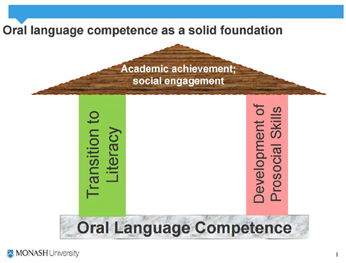Most students learn language through immersion. They have an innate ability to process the language in their environment and use their existing knowledge to understand and use language, including vocabulary, sentence structure, and appropriate social use. These students are able to think about language to construct meaning and adjust their understanding and use of language in response to new information. However, students with language delay or disorder do not learn language through immersion at the same rate as their peers. Developmental language delay or disorder is likely to be the result of many complex interactions between genetics and the environment. It is unlikely to be related to particular parenting styles or behaviours. Research continues to explore the genetic and environmental contributions that affect language development, processing, and/or auditory perception. Additionally, language delay or disorder may be associated with early developmental conditions, hearing loss, or brain damage. This does not mean that we cannot develop children’s language abilities and support them to reduce the impact of their difficulties.
Some students have difficulties with the social use of language despite receptive (understanding) and expressive (use) of language within the average range for their age. These children may have difficulty understanding and using social language in socialisation. Children with language delay or disorder require explicit instruction in the top-down and bottom-up processes needed for learning language and many repetitions of language models in order to acquire the language content, structure, and social use required for learning and academic progress at school. Since language is the primary way the curriculum is delivered, adjustments will need to be made across all learning areas to ensure students with language difficulties have similar access to the curriculum as their peers. Students with language delay or disorder may also have difficulty using social language appropriately in socialisation.
